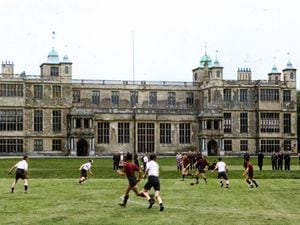Appeal for wartime memories on anniversary of first mission of Cichociemni
The elite group of special operations paratroopers, trained in covert operations, sabotage and intelligence-gathering, were all volunteers.

An appeal for wartime memories has been launched on the 80th anniversary of the first mission of the Cichociemni – the elite Polish paratroopers who trained in Britain and led the resistance against Hitler’s forces in Nazi-occupied Poland.
Many of the Cichociemni, “the silent and unseen”, completed their training at Audley End House in Essex as part of a little-known chapter in the secret war against the Nazis.
Much of their training took place within the grounds of the house, though some exercises took them further afield including raiding the local post office and railway station.
Polish trainers were allowed off base to visit local pubs and cafes, and during night exercises the trainee agents occasionally came to blows with the local police or Home Guard who came across their nocturnal manoeuvres.

Their first air drop, behind enemy lines in Nazi-occupied Poland, was on the night of February 15 into February 16, 1941.
The elite group of special operations paratroopers – trained in covert operations, sabotage and intelligence-gathering – were all volunteers.
Of 316 Cichociemni who were dropped into occupied Poland between 1941 and 1945, 103 were killed in combat with the Germans or executed by the Gestapo.
A further nine were killed by the communists in Poland after the war.

Arkady Rzegocki, Polish Ambassador to the UK, said the anniversary is an “important date in the history of Poland, Polish special operations forces and Polish-British relations”.
Their first mission offered a “glimmer of hope to the besieged homeland that help was coming”, he said, adding that their service was “brave and heroic”.
Some 2,613 Polish Army soldiers volunteered for special operations training during the war, but only 606 completed the rigorous training course, with 527 of them doing so at Audley End House.
There is a memorial to the Cichociemni in the house’s grounds but – unsurprisingly for a group of highly trained secret agents – there is little trace they were ever there.

There are nails in bedroom walls of the Jacobean stately home where the agents hung pictures of home.
There is also a scrap of graffiti in the coal gallery candle store, torn labels in the cellar where guns and ammunition were stored, the remnants of a timetable in the former briefing room and insulators for telephone wires still stuck in trunks of trees.
Andrew Hann, historian for English Heritage – which looks after Audley End House, said: “We’d love to hear from the public who have a connection or story to share about the Cichociemni at Audley.
“We’re particularly interested in hearing from those in the local area at the time, who may remember hearing bangs in the night, or seeing troops crossing fields in the darkness.
“Perhaps unsurprisingly, given that they were highly trained to be both ‘silent and unseen’, they left little obvious trace.”
He went on: “It is a privilege to play a small part as a caretaker of this incredible story where individuals acted so selflessly to risk everything in the defence of their homeland against Nazi occupation.
“We are honoured that Audley End has come to hold such as special place for Poles as the spiritual home of wartime resistance and we’re committed to helping share that story in the hope that the sacrifices of these extraordinary people go on to inspire future generations.”
Those with memories to share should email press@english-heritage.org.uk





